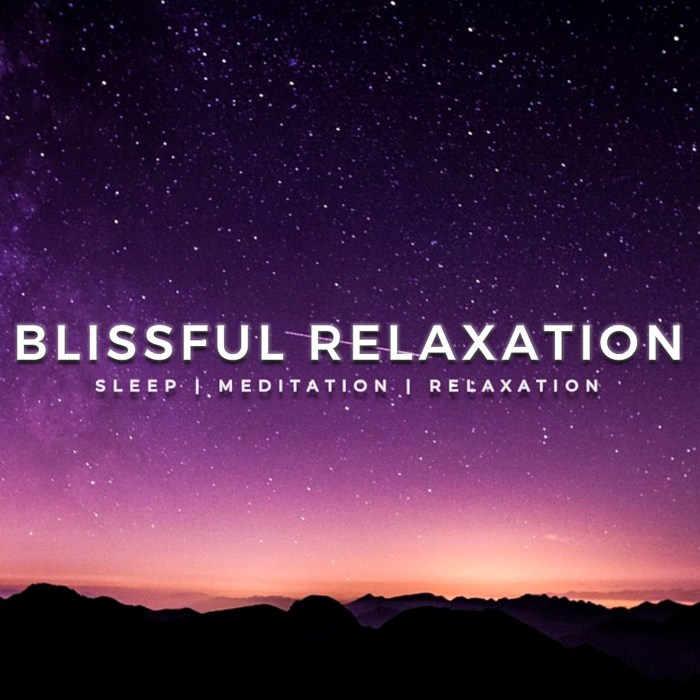Immerse yourself in the soothing world of Meditation music for deep relaxation, where the power of sound transcends stress and invites tranquility. From physiological benefits to creating the perfect playlist, this journey explores the transformative potential of music in calming the mind and nurturing the soul.
Discover the harmony between melodies and mindfulness as we delve into the realm of Meditation music for deep relaxation, offering insights and inspiration for those seeking inner peace and serenity through the art of sound.
Benefits of Meditation Music for Deep Relaxation

Source: cloudfront.net
Listening to meditation music can have numerous physiological benefits that contribute to overall well-being and relaxation. The soothing sounds and melodies can have a profound impact on both the mind and body, promoting a state of calmness and tranquility.
Reduction of Stress and Anxiety Levels
- Meditation music has been shown to help lower cortisol levels, the hormone responsible for stress, thereby reducing feelings of anxiety and tension.
- The calming music can act as a natural relaxation technique, helping to quiet the mind and alleviate symptoms of anxiety disorders.
Improvement in Sleep Quality
- Listening to meditation music before bedtime can create a peaceful environment conducive to falling asleep faster and experiencing deeper, more restful sleep.
- The slow tempo and gentle rhythms of the music can help regulate breathing and heart rate, promoting relaxation and preparing the body for a restful night’s sleep.
Enhancement of Focus and Concentration
- Meditation music can aid in improving concentration by providing a calming background that reduces distractions and promotes mental clarity.
- The soothing sounds can help induce a meditative state, allowing the mind to focus on the present moment and enhance cognitive performance.
Types of Meditation Music for Deep Relaxation

Source: mzstatic.com
Music plays a crucial role in creating a calming atmosphere for meditation. Different genres, instruments, nature sounds, rhythms, and tempos can be used to enhance deep relaxation during meditation.
Genres of Music Suitable for Meditation
- Ambient Music: Characterized by soft, atmospheric sounds that create a sense of tranquility.
- Chanting: Repetitive vocal sounds or mantras that help focus the mind and induce relaxation.
- Instrumental: Music played on instruments like flutes, singing bowls, or harps that soothe and calm the listener.
Instruments Commonly Used in Meditation Music
- Flute: Known for its gentle and melodious tones that promote relaxation.
- Singing Bowls: Produces harmonic sounds that resonate with the body and mind.
- Harp: Delicate strings create a serene and peaceful ambiance ideal for meditation.
Role of Nature Sounds in Enhancing Relaxation
- Nature sounds like flowing water, chirping birds, or rustling leaves mimic natural environments, promoting a sense of calm and connection to the earth.
- These sounds help mask background noise, allowing the meditator to focus inward and deepen their practice.
Importance of Rhythm and Tempo in Meditation Music
- The rhythm of music can guide breathing patterns and help synchronize the body and mind for a more profound meditative experience.
- A slower tempo induces a sense of relaxation and slows down the heart rate, aiding in stress reduction and deep relaxation.
Creating the Ideal Meditation Music Playlist

Source: bcbits.com
When it comes to crafting the perfect meditation music playlist, there are several factors to consider in order to enhance your overall meditation experience. Whether you are looking to relax, relieve stress, or improve focus, selecting the right tracks and structuring your playlist thoughtfully can make a significant difference in the effectiveness of your practice.
Selecting the Right Tracks
Choosing the right tracks for your meditation playlist is crucial to creating a soothing and immersive experience. Opt for instrumental music, nature sounds, or ambient sounds that are calming and gentle on the ears. Avoid tracks with lyrics or sudden loud noises that may disrupt your concentration.
Structuring Your Playlist for Different Meditation Purposes
- For Sleep: Include soft, slow-tempo tracks that promote relaxation and induce a sense of calmness.
- For Stress Relief: Incorporate nature sounds, gentle melodies, and soothing tones to help alleviate stress and anxiety.
- For Focus: Choose repetitive, instrumental tracks with a steady rhythm to enhance concentration and mindfulness.
Transitions Between Tracks
Creating seamless transitions between tracks is essential for maintaining a continuous flow and preventing interruptions during your meditation session. Ensure that there is a smooth transition in tempo, volume, and mood between each track to maintain a harmonious atmosphere.
Personalizing Your Playlist
- Consider your personal preferences, such as favorite instruments, sounds, or genres, when curating your meditation playlist.
- Experiment with different tracks and arrangements to find what resonates best with your individual meditation practice.
- Update and modify your playlist regularly to keep it fresh and engaging for your meditation sessions.
Incorporating Meditation Music into Daily Routine

Source: ggpht.com
Integrating meditation music into your daily routine can have numerous benefits for your overall well-being and mental health. Whether you choose to listen to soothing sounds in the morning to start your day on a calm note or wind down with relaxing melodies before bedtime, incorporating meditation music can enhance your daily rituals.
Morning Routine
- Start your day with gentle and uplifting meditation music to set a positive tone for the day ahead.
- Listen to nature sounds or instrumental music while getting ready or during breakfast to promote a sense of peace and mindfulness.
- Take a few moments to sit quietly with your eyes closed and focus on the music to center yourself before starting your daily activities.
Bedtime Routine
- Wind down in the evening with calming meditation music to relax your mind and body before sleep.
- Create a soothing playlist of soft melodies or ambient sounds to help you unwind from the day’s stresses.
- Listen to meditation music while practicing deep breathing or gentle stretches in bed to promote relaxation and prepare for a restful night’s sleep.
During Yoga or Mindfulness Practices
- Enhance your yoga or mindfulness sessions by playing meditation music in the background to deepen your practice.
- Choose music that complements the flow of your movements and helps you stay present in the moment.
- Allow the soothing sounds to guide your breathing and movements, creating a harmonious experience for body and mind.
Creating a Calming Environment
- Set up a dedicated space for meditation with comfortable cushions, soft lighting, and plants to enhance the ambiance.
- Play gentle meditation music at a low volume to create a tranquil atmosphere that promotes relaxation and focus.
- Use essential oils or incense to stimulate your senses and deepen your connection to the present moment while listening to calming music.
Relaxation Outside of Traditional Meditation Sessions
- Listen to meditation music during moments of stress or anxiety to help calm your mind and bring a sense of peace.
- Take short breaks throughout the day to listen to soothing sounds and recenter yourself amidst a busy schedule.
- Use meditation music during activities like reading, journaling, or walking to enhance mindfulness and relaxation in everyday tasks.
Closing Notes

Source: mzstatic.com
As we conclude this melodic exploration of Meditation music for deep relaxation, may the symphony of tranquility continue to resonate in your daily life, guiding you towards a state of profound peace and well-being. Let the music be your companion on this journey of self-discovery and inner harmony.